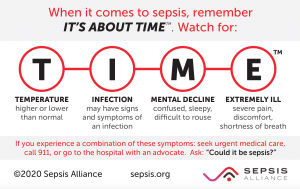Does Someone With a History of Dic at Risk to Have It Again
Disseminated intravascular coagulation, or DIC, is a complicated condition that can occur when someone has severe sepsis or septic stupor. Both blood clotting and difficulty with clotting may occur, causing a vicious cycle. Small-scale claret clots can develop throughout your bloodstream, especially in the microscopic blood vessels called capillaries, blocking the blood catamenia to many parts of your body, including your limbs and your organs. This blood flow brings oxygen and nutrients to the tissues. On the reverse side of the bicycle, DIC can increase haemorrhage. The body uses upward so many of the blood clotting proteins for the multiple blood clots in the blood vessels that at that place are not plenty left to clot the blood elsewhere.
Several medical conditions tin cause DIC, including sepsis. DIC affects nearly 35% of patients who accept sepsis. Sometimes incorrectly chosen blood poisoning, sepsis is the trunk's oft deadly response to infection. Sepsis and septic stupor can result from an infection anywhere in the body, such as pneumonia, influenza, or urinary tract infections. Like strokes or heart attacks, sepsis is a medical emergency that requires rapid diagnosis and treatment. Worldwide, 1-tertiary of people who develop sepsis die. Many who do survive are left with life-irresolute furnishings, such as post-traumatic stress disorder (PTSD), chronic hurting and fatigue, organ dysfunction (organs don't work properly), and/or amputations.
Symptoms of DIC
- Blood clots
- Bruising, mottling of the peel
- Drop in blood pressure
- Bleeding, from many sites in the body
Treatment of DIC
When someone has DIC caused past sepsis, the primary task is to treat the sepsis and the infection that caused it. Treating the clots is also important. Heparin, an anticoagulant, often called a blood thinner, usually dissolves clots and prevents new ones. When someone receives heparin, their blood is tested regularly for its ability to clot – whether information technology is clotting also quickly or not quickly enough – so the heparin dose can exist adjusted as needed.
A transfusion of platelets may be necessary. Platelets are a component of your blood that helps course clots.
Complications from DIC
If clots prevent claret from reaching parts of the body, tissue impairment occurs. For example, if clots prevent blood from circulating properly to the hands or feet, the tissue may start to turn splotchy, then bluish in color (cyanotic), and then black (gangrenous) if the skin dies. Once the tissue is at this phase, information technology must be removed. For some people, this may exist a small patch of pare or a few fingers or toes. For others, it could mean the amputation of one or more limbs.
If blood isn't effectively reaching vital organs like your kidneys, liver, or lungs, they may have problem functioning. For example, your kidneys may non be able to filter urine effectively. When this happens, you may need dialysis. If the kidneys regain function, yous may no longer need dialysis. Or, if you are having difficulty breathing because of DIC, the doctors may choose to place y'all on a ventilator, a automobile that pushes air into your lungs, effectively breathing for you. This is removed when you lot tin exhale once more on your own.
Long-term outlook
The long-term outlook for people who accept DIC depends on how much damage the clots may take caused to the body's tissues. About half of those with DIC survive, but some may live with organ dysfunction or the results of amputations.
If you doubtable sepsis, call ix-one-1 or go to a infirmary and tell your medical professional, "I AM CONCERNED ABOUT SEPSIS."

Would you like to share your story about sepsis or read about others who take had sepsis? Please visit Faces of Sepsis, where y'all will find hundreds of stories from survivors and tributes to those who died from sepsis.
Suggested Citation: Sepsis Alliance. Sepsis and Disseminated Intravascular Coagulation (DIC). 2022. https://www.sepsis.org/sepsisand/disseminated-int…-coagulation-dic/
Updated Feb 10, 2022.
Source: https://www.sepsis.org/sepsisand/disseminated-intravascular-coagulation-dic/
0 Response to "Does Someone With a History of Dic at Risk to Have It Again"
Post a Comment